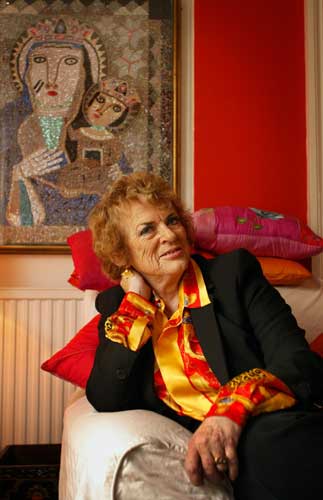Passed/Failed: An education in the life of the journalist Ann Leslie
'I went to boarding school at age four'

Your support helps us to tell the story
From reproductive rights to climate change to Big Tech, The Independent is on the ground when the story is developing. Whether it's investigating the financials of Elon Musk's pro-Trump PAC or producing our latest documentary, 'The A Word', which shines a light on the American women fighting for reproductive rights, we know how important it is to parse out the facts from the messaging.
At such a critical moment in US history, we need reporters on the ground. Your donation allows us to keep sending journalists to speak to both sides of the story.
The Independent is trusted by Americans across the entire political spectrum. And unlike many other quality news outlets, we choose not to lock Americans out of our reporting and analysis with paywalls. We believe quality journalism should be available to everyone, paid for by those who can afford it.
Your support makes all the difference.Dame Ann Leslie, 67, has reported for the 'Daily Mail' from more than 70 countries, covering the fall of the Berlin Wall and the release of Nelson Mandela. She has appeared on 'Question Time' and 'Any Questions?' Her autobiography, 'Killing My Own Snakes', is out now.
My mother had many marvellous qualities, but being maternal was not one of them. She preferred to have me off the premises. We lived in India, where my father was in the oil business, and at the age of four I went to boarding school. I remember I was always being put on huge, long trains. I went to so many boarding schools. The one I remember with enormous affection was St Hilda's, an Anglican school in Ooty [Tamil Nadu, southern India]. I liked the routine and the certainty that we would have puffed rice and eggs for breakfast.
I knew instinctively that I wouldn't be allowed to stay for a long time. There were what I saw as omens. I was taking a dog for a walk and a panther got it; later I was bitten by a rabid dog. And at nine and a half, I went "home", not to where we lived in India, but to exile in England.
The Presentation Convent in Matlock was the most ghastly culture shock. This bloody school in the Peak District was so cold and damp that I had permanent chilblains. I was totally miserable. It was so Catholic: there were endless masses and confessions. But there was one nun who was an absolutely brilliant teacher. She realised that I was a swot and gave me private classes. There was nothing to do apart from bloody praying, so I would read. I don't think I would have been even half-way educated if I had been happy. I did my O-levels early, at 14 and a half, and went to the Convent of the Holy Child in Mayfield, Sussex.
I liked this convent. My swottish habits meant that I was ahead scholastically. I took English, history and French A-levels. I had a separate room to myself instead of being in a dormitory. This school was more upper class; various ancient Catholic families sent their children here. Also, Latin-American diplomats used to send their children, all looking like Gisele Bündchen. Every now and then, these gorgeous parakeets would go into a huddle and sob and scream: their parents would have written to say that they were now in an arranged marriage with the man who owned the other half of Chile.
Cambridge was going to give me a scholarship, but at the interview they thought I was trivial because I enthused about films made of Shakespeare plays. They only offered me an exhibition but Oxford gave me a scholarship to read English at Lady Margaret Hall.
I panicked at my prelims in my first year, as I hadn't done much work. I didn't fail, but I only passed by a whisker. In my finals, I think I was vivaed for a First but I got a Second.
Oxford was amazing. I wasn't glamorous but was always in the slipstream of glamorous people such as Paul Foot and Richard Ingrams, the intellectual stars. This was a good preparation for being a foreign correspondent, a life spent in the slipstream of great world events. I didn't do any journalism but my then boyfriend, now my husband, used to write for Isis. Michael had a girlfriend but I persuaded him to dispose of her. Alan Coren, who later became editor of Punch, said years later that he was always trying to get off with me but I must say I never noticed.
There was a big shambling blond guy. He would come into my room and show me the poetry he had written and I would jeer about it with my friends. He was Stanley Johnson, father of Boris, and he won the prestigious Newdigate prize for poetry. I used to wonder how Stanley had got into Oxford. But never underestimate a Johnson! As they say of Hungarians, they go into the revolving door behind you – and get out in front.
Join our commenting forum
Join thought-provoking conversations, follow other Independent readers and see their replies
Comments